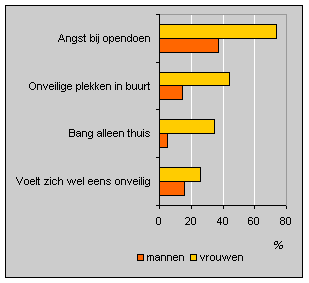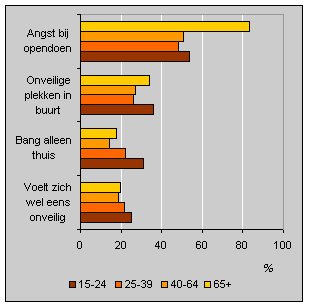More women than men feel unsafe

More than a quarter of Dutch women say that they feel unsafe sometimes, compared with fifteen percent of men. Nearly three-quarters of women would not answer the door without thinking at ten o’clock in the evening if they were not expecting anybody. This is twice as many as the number of men. Nearly 35 percent of women are sometimes afraid if they are alone in the house, compared with five percent of men. In all respects, therefore, women more often feel unsafe than men.
Feeling unsafe, by sex, 2000

Old people afraid in the evening
One quarter of people aged between 15 and 25 say they feel scared sometimes. These feelings of insecurity decrease between ages 25 and 65 , but increase again above age 65. Nearly twenty percent of over-65s sometimes feel unsafe.
People aged 25-64 years are less afraid to open the door and fewer of them are aware of unsafe places in their neighbourhood than people in the youngest and oldest age categories. Over-65s in particular are more likely to feel scared if the door bell rings in the evening. More than eighty percent said they would think twice about opening the door if the bell went unexpectedly at ten o’clock in the evening. Young people are scared to stay at home alone: more than one in three are sometimes scared when they are alone in the house.
Feeling unsafe, by age, 2000

Men less scared but more often victims
Young women more often feel unsafe than older women. One in three women aged under 25 say they feel unsafe sometimes. The likelihood of being the victim of a crime is indeed greater for younger than for older women.
Victims and feelings of insecurity by age and sex, 2000
Although men in all age groups are more at risk than women, they are less likely to feel unsafe. One in six men aged under 25 say they sometimes feel unsafe. This is only slightly more than average, while men in this age group run the greatest risk of falling victim to a crime.
Miranda de Vree